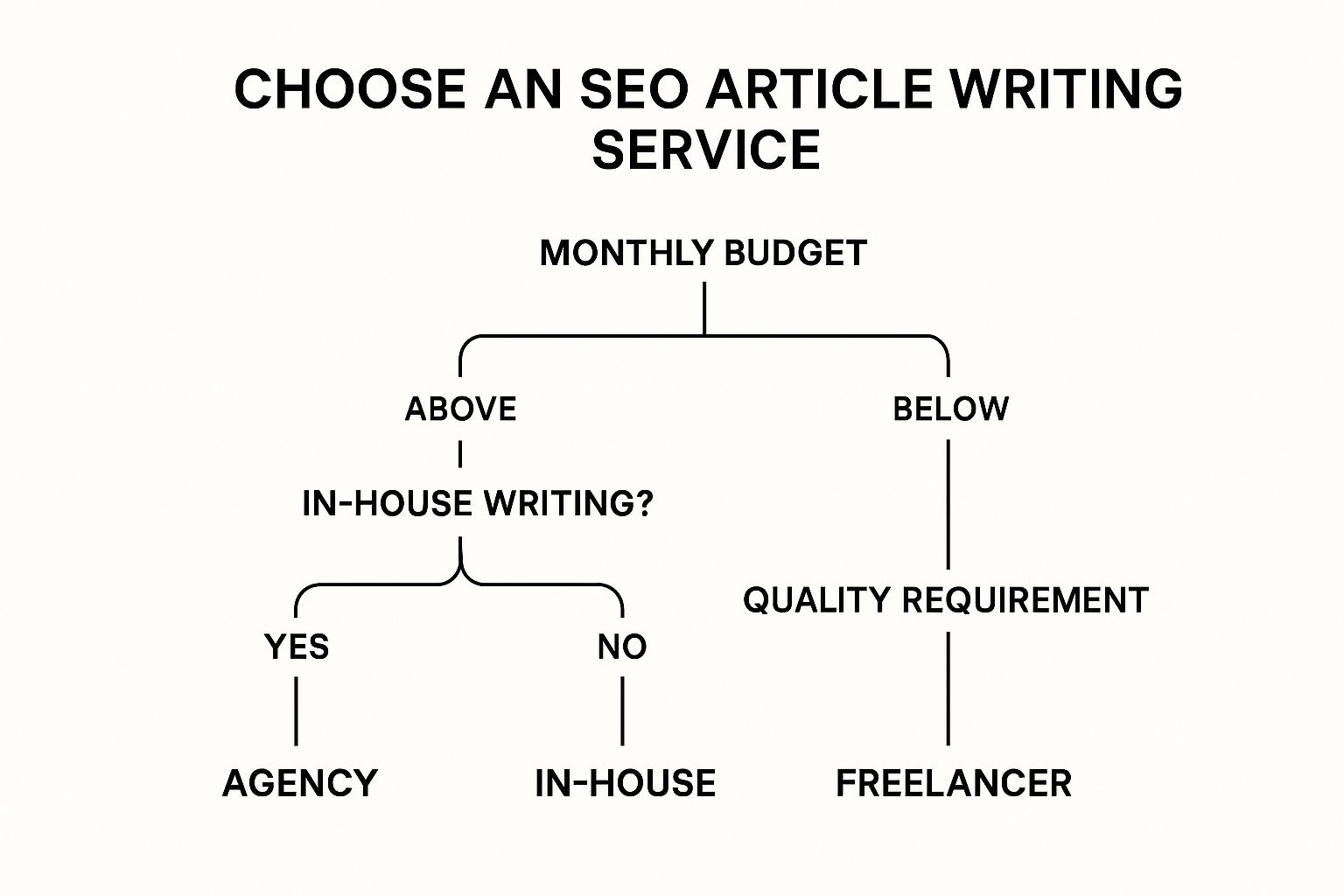SEO article writing services are basically a one-two punch for your online content. They combine expert writing with a smart technical SEO strategy to get your articles ranking high on search engines like Google, pulling in organic traffic that turns into real customers.
What Are SEO Article Writing Services Really
Let’s think about it this way: imagine you hire someone to write an article. A standard writer might build you a perfectly good, sturdy house. It has four walls and a roof. It does the job.
An SEO article writing service, on the other hand, is like hiring a master architect to build a flagship store on Fifth Avenue. They don’t just build a structure; they design it for maximum visibility, foot traffic, and appeal. They make sure the signs are perfect, the entryway is welcoming, and it’s exactly what people are looking for.
That’s what these services do for your website. They create content that doesn’t just sit there—it actively pulls the right people to your digital front door.
This whole process is a blend of creative writing artistry and the hard science of search optimization. It's built to solve one of the biggest problems in business: being invisible online. Before we go any further, it’s really helpful to understand the fundamentals of What is SEO in Digital Marketing. Knowing that will make it crystal clear why just writing a good article often isn’t enough to get it seen.
The Strategic Difference
What really sets SEO content apart is that it's engineered from the very beginning to please two audiences: your human readers and the search engine algorithms. It’s designed to directly answer the questions your potential customers are typing into Google, which instantly positions your brand as a helpful authority.
An effective SEO article is a business asset that appreciates over time. It continuously works to attract qualified leads, build trust, and drive revenue long after it's published.
This is a world away from general content writing, which might focus more on brand voice or pure storytelling without a concrete plan for how people will find it through search.
To really see the difference, let’s break it down. Here’s a look at how a standard article compares to one built with SEO in mind.
Standard Content vs SEO-Driven Content
| Element | Standard Article Writing | SEO Article Writing |
|---|---|---|
| Primary Goal | Inform, entertain, or share a story. | Attract qualified search traffic and convert visitors. |
| Foundation | Based on an idea, brand message, or topic of interest. | Built on keyword research and user search intent. |
| Structure | Follows traditional writing flow (intro, body, conclusion). | Optimized with H1/H2/H3 tags, short paragraphs, and lists. |
| Audience | Written for a general audience or existing followers. | Written for a specific searcher looking for a solution. |
| Measurement | Success measured by shares, comments, or page views. | Success measured by keyword rankings, organic traffic, and leads. |
| Longevity | Impact is often short-lived, tied to a campaign or publish date. | Designed to be an "evergreen" asset that gains value over time. |
As you can see, the entire mindset is different. One is about creating a piece of content; the other is about creating a long-term business asset.
Beyond Just Keywords
There's a common myth that SEO writing is just about cramming keywords into a page. That might have worked in 2008, but it’s a rookie mistake today. Modern SEO article writing services are far more sophisticated.
Here’s a peek at what they actually do:
- User Intent Analysis: They dig into the why behind a search. Is someone looking to buy, learn, or compare? The content is then crafted to give them exactly what they need.
- Topical Authority Building: They don’t just write one-off articles. They create interconnected clusters of content that signal to Google that you're a true expert in your field.
- On-Page Optimization: This is the technical stuff—crafting killer titles and meta descriptions, using headings correctly, and making it easy for search engines to crawl and understand your content.
- Readability and Engagement: No one wants to read a wall of text. They structure articles with short paragraphs, bullet points, and images to keep people on the page and engaged.
The demand for this kind of strategic content is blowing up. The global SEO content writing services market is on track to hit USD 61.27 billion by 2033, growing at a blistering 13.5% each year. This isn't just a trend; it's a fundamental shift in how businesses from every industry get seen online.
The Blueprint of a High-Ranking SEO Article

Getting an article to the top of Google isn't about luck. It’s about having a solid game plan. Every single piece of a top-performing article is engineered to satisfy both curious readers and Google’s ever-watchful algorithms. Forget the old days of just stuffing keywords everywhere; today's SEO is a masterclass in precision.
Think of it like building a powerful magnet. The headline, the images, the internal links—every component is strategically placed to pull in your target audience and keep them hooked.
And believe it or not, this entire process kicks off long before a single word gets written.
Uncovering User Intent with Keyword Research
It all starts with getting inside your audience's head. What are they actually looking for? This goes way beyond just picking a few keywords. We need to figure out their user intent—the real "why" behind their search. Are they just browsing for info, comparing options, or are they ready to pull out their credit card?
Understanding the foundational role of keywords in content strategy is non-negotiable, shaping everything from the topic you choose to the words you use on the page. Professional seo article writing services use specialized tools to dig deep, finding not just what people are asking, but the exact phrasing they use.
For instance, someone searching "best running shoes" is in a buying mood. They need a different article than someone searching "how to choose running shoes," who is still in research mode. Nail the intent, and you deliver exactly what the user wants—something Google absolutely loves to see.
Crafting a Compelling Digital First Impression
Your meta title and description are your article's billboard on the search results page. You’ve got a split second to convince someone that your link is the one they need to click, not the nine others surrounding it.
A killer meta title is:
- Attention-Grabbing: It has to pop off the page.
- Keyword-Focused: Weave your main keyword in naturally, preferably near the start.
- Concise and Clear: Keep it under 60 characters so it doesn't get awkwardly chopped off.
The meta description is your thirty-second elevator pitch. It’s a snappy summary (around 155 characters) that sells the value of your content and often ends with a clear nudge, like "Learn more" or "Find out how."
A well-crafted title and description can seriously boost your click-through rate (CTR), which is a huge signal to Google that your content is hitting the mark.
Building a Logical and Readable Content Structure
Okay, they clicked. Now what? The article’s structure is what makes them stay. Both people and search engine crawlers love content that’s well-organized and easy to skim.
Nobody wants to face a giant wall of text. That's a one-way ticket to a high bounce rate. Instead, a high-ranking article is built with a clear hierarchy:
- H1 Title: This is your one and only main headline.
- H2 Subheadings: Think of these as the major chapters of your article.
- H3 Subheadings: These break your chapters down into smaller, bite-sized points.
This structure, paired with short paragraphs, bullet points, and bold text for emphasis, makes the information easy to digest. It lets readers jump straight to the answers they're looking for, which creates a better experience and tells search engines your content is high-quality. Sprinkling in some internal links to other relevant posts on your site also helps guide users and spreads your SEO authority around.
Why Investing in Professional Services Pays Off

Handing over your content creation to an expert service isn’t just about getting tasks off your plate. It’s a strategic move toward predictable, long-term growth. Sure, the DIY route seems cheaper at first glance, but it's loaded with hidden costs—time, missed opportunities, and the brutal learning curve of SEO.
Think of professional SEO article writing services as a force multiplier for your entire marketing department. You're not just buying a few blog posts. You're tapping into a team of specialists whose sole purpose is to get results from search engines.
This mindset shift is everything. Instead of seeing content as another expense, you start treating it like a core business asset—one that works around the clock to bring your ideal customers straight to you.
Gaining a Competitive Edge with Specialized Expertise
Your team members are experts at what they do, which is running your business. It’s a huge ask to expect them to also be masters of keyword research, on-page optimization, and Google's latest algorithm whims. A professional service brings in a dedicated team with sharp, specialized skills they’ve honed across dozens of industries.
This focused expertise brings some serious benefits to the table:
- Access to Advanced Tools: Agencies shell out thousands for premium SEO software like Ahrefs or Semrush for deep keyword research, competitor analysis, and rank tracking. These tools are often way too pricey for a single company's budget.
- Proven Strategies: They’ve already battle-tested their processes for creating content that actually ranks. They know what works—and just as importantly, what doesn't—saving you from a world of costly trial and error.
- Staying Ahead of Algorithm Updates: Google is always changing the rules. A dedicated service makes it their business to stay on top of every update, ensuring your strategy doesn't become obsolete overnight.
This lets you completely sidestep that steep learning curve and immediately start using strategies that put you ahead of competitors who are still trying to figure it all out.
From Traffic to Tangible Business Outcomes
Look, the goal isn't just to see your name higher on a search results page; it's to drive real business growth. This is where a professional service truly proves its worth, by connecting high-quality content directly to your bottom line.
A well-oiled SEO content strategy builds a powerful, self-sustaining engine for lead generation. Each article isn't a one-and-done deal. It's a digital salesperson working for you 24/7, long after you've paid the invoice.
SEO content is the only form of marketing that truly compounds over time. When you stop paying for ads, the traffic stops. A high-ranking article, on the other hand, can generate traffic and leads for years, delivering an ever-increasing ROI.
You can see this value reflected in the market's explosive growth. The global content writing services market was valued at USD 19.9 billion in 2023 and is on track to nearly double to USD 38.6 billion by 2033. Why? Because businesses are finally realizing that smart content is a primary driver of brand authority and leads. You can explore more about this growing market and its trends.
The True ROI of Outsourcing Content
When you crunch the numbers on your return on investment, you have to look at the whole picture. It’s not just about how many articles you got for your money. It’s about the countless hours saved, the qualified leads generated, and the stronger brand authority you've built in your industry.
By outsourcing, you free up your internal team to do what they do best—serving customers and innovating your products. The SEO service, in turn, does the heavy lifting to turn your website into a reliable source of organic growth. It's a win-win that pays dividends for years to come.
How to Choose the Right SEO Writing Partner
Picking the right provider for seo article writing services is probably the single most important decision you'll make for your content strategy. It's like choosing a co-pilot for a long-haul flight; the right one gets you to your destination smoothly, while the wrong one means a ton of turbulence and expensive detours.
Honestly, this one choice is what separates a content engine that hums along from one that’s completely stalled out.
To make a smart decision, you have to look past the slick sales pitches and dig into tangible proof and how well their strategy aligns with yours. A great partner doesn't just write words. They strategize, analyze, and adapt to help you actually win in the search results.
This decision tree infographic is a great way to visualize which path—agency, freelancer, or in-house—might be the best fit for you based on your budget, existing team, and how much quality matters.

As you can see, what you can spend and what you expect in return are the two biggest factors in deciding who to partner with.
Evaluate Their Portfolio and Industry Experience
First things first: look at their track record. Any reputable service will have a portfolio they're genuinely proud to show off. Don’t just skim the headlines—actually click through and read the articles.
Ask yourself a few key questions:
- Is the writing high-quality and engaging? Does it sound like a real person wrote it, or is it just robotic keyword-stuffing?
- Do they have experience in your niche? Writing for a B2B SaaS company is a totally different ballgame than writing for a local bakery. Relevant experience means less hand-holding.
- Can they show you performance data? You want to see case studies or real examples of articles that are ranking high and driving traffic.
A solid portfolio is the best proof you'll get that they can actually deliver on their promises. If they get cagey about sharing examples, that's a huge red flag.
Scrutinize Their Strategic Process
Great SEO content isn't an accident. It comes from a methodical, data-driven process. The best seo article writing services are totally transparent about their workflow, from the initial research all the way to the final draft.
A provider who just sells "words on a page" is a commodity. A partner focused on a strategic process—keyword research, competitive analysis, and on-page optimization—is an investment in your growth.
You need to understand their entire game plan. When you're talking to potential partners, don't be afraid to ask very specific questions about how they do things.
Key Questions to Ask Potential Partners
Before you sign anything, treat the conversation like an interview. Their answers will tell you everything you need to know about their expertise and whether they’re the right fit for your goals. If you want to go even deeper, our guide on choosing the best SEO content writing service has more criteria you can use.
Come to the meeting with a list of pointed questions ready to go:
- How do you conduct keyword research and figure out user intent? Their answer needs to go beyond just looking at search volume. They should be talking about analyzing competitors and truly understanding the why behind a search.
- What’s your process for creating content briefs or outlines? A solid process means building a detailed blueprint for each article before writing, making sure it hits every point needed to outrank the competition.
- How do you measure the success of the content you create? Look for answers that are about more than just vanity metrics. They should be talking about keyword rankings, organic traffic growth, and ideally, actual conversions or leads.
- How do you adapt to Google’s algorithm updates? A good partner will have a clear plan for staying informed and adjusting their strategy, not just reacting after your rankings have already dropped.
A confident, strategy-first provider will welcome these questions. Someone who gives vague, evasive answers is probably more interested in churning out content than getting you real results. Choosing wisely means finding a partner who can clearly map out a path to success.
Checklist for Vetting SEO Writing Services
To make this even easier, here’s a quick-reference table you can use when comparing different providers. It helps you keep track of what really matters and spot potential issues before you commit.
| Evaluation Criteria | What to Look For | Red Flags to Avoid |
|---|---|---|
| Portfolio & Case Studies | High-quality, engaging content samples with verifiable performance data (rankings, traffic). | Hesitation to share examples, generic samples, or a complete lack of performance metrics. |
| Niche Experience | Proven experience and published work within your specific industry or a closely related one. | No relevant experience; claiming they can "write about anything" without proof. |
| Strategic Process | A transparent, multi-step process including keyword research, competitor analysis, and content briefing. | A vague process focused only on "writing" and "delivering words." |
| SEO Expertise | Deep understanding of on-page SEO, user intent, E-E-A-T, and algorithm updates. | Over-emphasis on keyword density or outdated SEO tactics. |
| Communication & Reporting | Clear communication channels, regular updates, and performance reports tied to business goals. | Poor communication, missed deadlines, and reporting on vanity metrics only. |
| Pricing & Value | Transparent pricing that reflects a strategic partnership, not just a per-word rate. | Unbelievably low prices, which often signal low-quality, AI-spun, or outsourced content. |
Using this checklist helps you move beyond a gut feeling and make a data-backed decision. The goal isn't just to hire a writer; it's to find a true partner who is as invested in your growth as you are.
Inside the SEO Article Creation Process
So, what really happens when you hire a professional service? It’s a lot more than just lobbing a topic over the fence and getting a Word doc back. The best SEO article writing services run like a well-oiled machine, where every single step is designed to build an asset that performs.
This structured process is the secret sauce. It’s how they turn a vague business goal into a tangible, optimized article that’s built to rank and bring in customers. Let’s pull back the curtain and see how it works, from that first spark of an idea to the final published post.
Stage 1: Discovery and Strategy
It all starts with a deep dive into your business. And I don’t mean a quick email exchange. This is a real strategy session where the provider essentially becomes an extension of your marketing team. They need to get inside your brand’s DNA, figure out who your ideal customers are, and understand what you’re actually trying to achieve.
This first phase is where a true partnership is born. Anyone can write an article, but a great partner needs to grasp not just what you sell, but who you’re selling it to and what problems you’re solving for them. Everything that comes next is built on this foundation.
A winning SEO article isn't about what you want to say. It’s about finding the perfect intersection between your message and what your audience is actually searching for. That sweet spot is found in the strategy phase.
Stage 2: Research and Ideation
With a clear strategy locked in, the team shifts into research mode. This is where the "science" part of SEO really kicks in. Using powerful tools like Ahrefs or Semrush, they start digging for the exact phrases and questions your potential customers are typing into Google.
They aren't just hunting for keywords with big search numbers, either. They're analyzing a few key things:
- Search Intent: Figuring out why someone is searching. Are they trying to learn something, compare products, or are they ready to buy right now?
- Keyword Difficulty: Gauging how tough it will be to actually rank for a specific term.
- Competitive Landscape: Peeking at what the top-ranking articles are doing to find gaps and opportunities you can exploit.
This data gives them a treasure trove of powerful topic ideas that are primed to attract the right kind of traffic. It’s an approach driven by data, not guesswork, ensuring every article is built on a foundation of real user demand.
Stage 3: Outlining and Approval
Before a single sentence gets written, the provider creates a detailed outline or content brief. Think of it as the architectural blueprint for your article. It maps out the entire structure, including the main title, all the subheadings (H2s and H3s), the key points to hit in each section, and the target keywords.
This blueprint is then sent over to you for review. This is a critical checkpoint. It makes sure everyone is on the same page, which saves a ton of time on revisions later and confirms the article is headed in the right strategic direction.
Stage 4: Writing and Optimization
Once you give the green light on the outline, the writer gets to work. A talented SEO writer does more than just string words together; they weave in keywords naturally, focusing on making the content clear, engaging, and genuinely valuable. At the same time, they're plugging in all the critical on-page SEO elements. If you want a closer look at what that involves, our guide on the essentials of SEO content creation services breaks it down further.
This means optimizing things like meta titles, descriptions, image alt text, and adding internal links to other relevant pages on your site. The goal is to create something that’s a delight for a human to read but also perfectly structured for Google’s crawlers to understand. This dual focus is what separates the pros from the content mills.
The demand for this kind of integrated service is exploding. The global content writing services market is expected to jump from USD 22.63 billion in 2025 to a whopping USD 35.63 billion by 2032. You can discover more insights about this market’s growth on Coherent Market Insights.
Stage 5: Editing and Quality Assurance
Finally, no article is ever sent out without passing through a rigorous quality check. A separate editor gives the piece a thorough once-over, hunting for any grammar issues, typos, or inconsistencies with your brand’s voice. They also run a final SEO audit to double-check that every optimization box has been ticked.
This two-step process—writer then editor—ensures the final product is polished, professional, and strategically sound. It’s ready to publish the moment it lands in your inbox.
Measuring the ROI of Your SEO Content

When you invest in SEO article writing services, you're making a calculated business move. And just like any other investment, you need to know if it's paying off. Proving your return on investment (ROI) isn't about a gut feeling; it’s about drawing a straight line from your content to real, tangible business results.
This is how you shift the conversation from, "Yeah, we published a few blog posts," to "Our articles brought in X number of qualified leads this quarter."
When you track ROI, content stops being a simple expense line and transforms into a predictable engine for growth. By keeping a close eye on the right key performance indicators (KPIs), you can prove the value your articles are creating and use that data to make smarter decisions down the road. The best part? Tools like Google Analytics and Google Search Console give you everything you need to get started.
Key Performance Indicators That Matter
To really see what’s working, you need to look past vanity metrics like page views. Sure, traffic is a great start, but the quality of that traffic—and what those visitors do next—is where the real ROI lives.
These are the core KPIs you should have on your dashboard:
Organic Traffic Growth: This is your bread and butter. A steady increase in visitors from search engines is the clearest sign that your content is hitting the mark and pulling in an audience.
Keyword Ranking Improvements: Are your articles climbing the ranks for your target keywords? Watching your content move up the search engine results pages (SERPs) proves that Google views your articles as authoritative answers to user questions. For more on this, check out our guide on https://copymasters.co/blog/improving-search-engine-rankings.
User Engagement Metrics: Numbers like a high time on page and a low bounce rate are gold. They tell you that people aren't just clicking; they're sticking around and actually reading what you've written. Google loves this, and it can give your rankings an extra boost.
The real goal of SEO content isn't just to get clicks. It's to attract the right people and gently guide them toward a business goal. That's where you find your ROI—in the action they take after they read.
Connecting Metrics to Business Goals
This is where it all comes together. Tracking traffic and rankings is one thing, but tying those numbers to your bottom line is what truly proves the value of your investment.
You can do this by setting up specific goals in Google Analytics to track the actions that matter most to your business. The most common and impactful conversions to watch are:
- Lead Generation: How many people filled out a contact form, signed up for your newsletter, or downloaded a guide after reading an article?
- Conversions: If you run an e-commerce store, this is simple: how many readers turned into buyers?
- Assisted Conversions: SEO content often plays a critical role at the beginning of the customer's journey. Someone might discover your brand through a blog post, then come back a week later through a different channel to make a purchase.
By putting a dollar value on each lead or sale, you can calculate the direct revenue your SEO content is generating. It gives you a crystal-clear picture of its financial impact. If you want to zoom out and see how this fits into the bigger picture, this guide on how to measure overall marketing ROI offers some fantastic insights.
Common Questions About SEO Writing Services
Even after seeing all the benefits, pulling the trigger on an SEO article writing service can feel like a big step. It’s natural to have a few nagging questions before you commit. Let's tackle some of the most common ones that pop up for business owners and marketers.
Think of this as the final gut-check before you dive in, making sure you’re picking a partner that fits your budget, goals, and timeline.
How Much Should I Expect to Pay?
This is the big one, right? The truth is, the cost of SEO writing is all over the map—there’s no single price tag. Most services structure their pricing in a few common ways.
You'll typically run into one of these models:
- Per-Word: Simple and straightforward. Rates can range from a few cents to over a dollar per word, depending on the writer's skill.
- Per-Article: A flat fee for the whole piece. This is fantastic for budgeting because you know exactly what you're spending upfront.
- Monthly Retainer: A fixed monthly cost for a set amount of work. This is the go-to for businesses serious about a long-term content strategy.
What you end up paying really boils down to the complexity of the content, how much research is involved, and the provider's experience. A deep-dive article on B2B SaaS technology will always cost more than a quick listicle for a lifestyle blog.
How Long Until I See Ranking Improvements?
Everyone wants to see their site shoot to the top of Google overnight, but SEO is a long game. It’s a marathon, not a sprint. It takes time for search engines to find your new content, figure out what it's about, and decide it's valuable enough to show people.
SEO is like planting a tree. You won't get shade overnight, but consistent effort and patience will result in a strong, valuable asset that provides benefits for years to come.
Generally, you can start looking for real, noticeable movement in your rankings and organic traffic within 3 to 6 months. This can speed up or slow down depending on factors like how much authority your website already has, how competitive your keywords are, and how consistently you're publishing new stuff.
Can I Still Have Input on Topics and Keywords?
Absolutely. In fact, you should run from any service that doesn't want your input. The best results come from a true partnership.
Think about it: you know your customers and your industry inside and out. A great SEO article writing service knows how to translate that expertise into content that search engines love. They need your brain.
Any reputable service will treat your insights like gold. They'll take your understanding of your audience's biggest problems and blend it with their data-backed keyword research. That’s the secret sauce—creating content that doesn’t just rank, but actually connects with real people and solves their problems.
Ready to turn your blog into a reliable growth engine? At Copy Masters, we deliver expertly crafted, search-optimized articles designed to outrank your competitors and drive consistent traffic. Learn more about our risk-free SEO content subscription.
- SaaS SEO Consulting for Predictable Growth - October 20, 2025
- What Is SEO Management Your Guide to Real Results - October 19, 2025
- A Guide to Quality Content for SEO That Ranks - October 18, 2025
